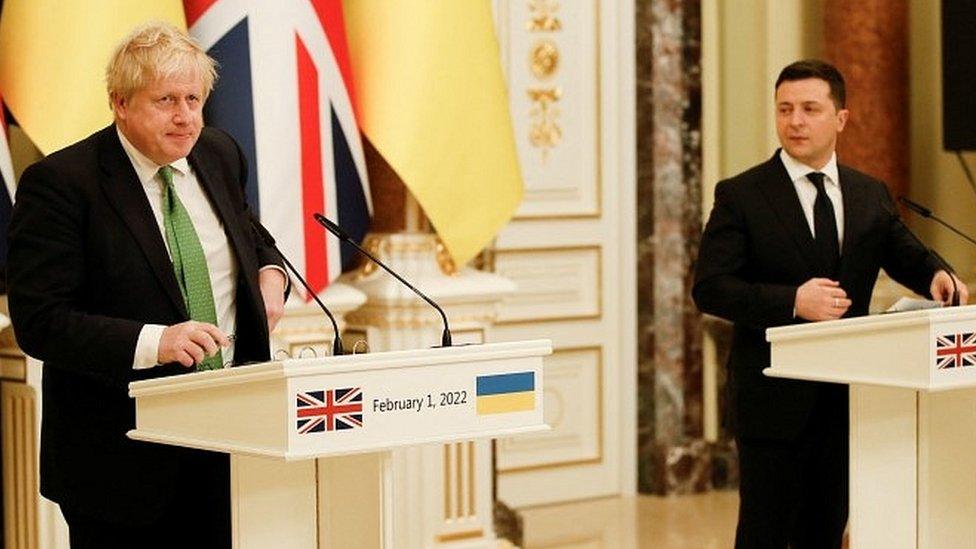Under-pressure Johnson takes to world stage with Ukraine visit
- Published

Boris Johnson and Volodymyr Zelensky held talks in Kyiv
For Boris Johnson, this trip to Ukraine was a change of subject, a change of place.
For a few hours on Tuesday the political difficulties of the last few days could be left behind and replaced by the more grave matters of European security.
He arrived in Kyiv to make a show of support for a country facing the threat of invasion, a country where political survival has a more visceral, existential meaning, far removed from the exaggerated metaphors of Westminster.
Mr Johnson told his Ukrainian counterpart Volodymyr Zelensky that Britain would always stand up for his country's freedom.
He promised him £88m in aid and he had a clear warning for Moscow: if a single Russian toe cap crossed the border, they would be met by a resolute Ukrainian army that would put up "a very fierce and bloody resistance. I think that parents, mothers in Russia should reflect on that."
Mr Johnson also warned Moscow there would be an "automaticity" about any economic sanctions that would be levelled against Russia if it invaded Ukraine.
So the messaging was clear - robust support for Ukraine, robust deterrence for Russia.
The question is whether this message was tempered by Mr Johnson's political preoccupations at home, all of which are being followed closely by diplomats overseas.
It has not gone unnoticed that while President Macron of France has been having regular telephone calls with President Putin, Mr Johnson's call with the Russian leader on Monday was postponed by the row over lockdown parties in Downing Street.
In fact, one of the noteworthy aspects of this crisis so far has been how much the West has managed to stick together with a united message, even though there are differences over policy.
Mr Johnson has his difficulties, the new German government is finding its feet, Mr Macron is in a tough electoral fight, the Americans have a president whose tongue occasionally slips.

But despite that, analysts say Russia has been surprised at its inability to divide its opponents.
Mr Johnson was not the only European leader in Kyiv on Tuesday - the Polish prime minister was there. Others are expected shortly.
There is a realisation - as Mr Zelensky pointed out - that if fighting breaks out, this would not be a conflict just between Ukraine and Russia; it could become a fully-fledged European war.
Mr Johnson's critics have accused him of using the crisis to try to look statesmanlike amid a damaging domestic controversy.
But perhaps they might also have criticised him if he had chosen not to come to Kyiv to engage in a confrontation in which the stakes remain high.